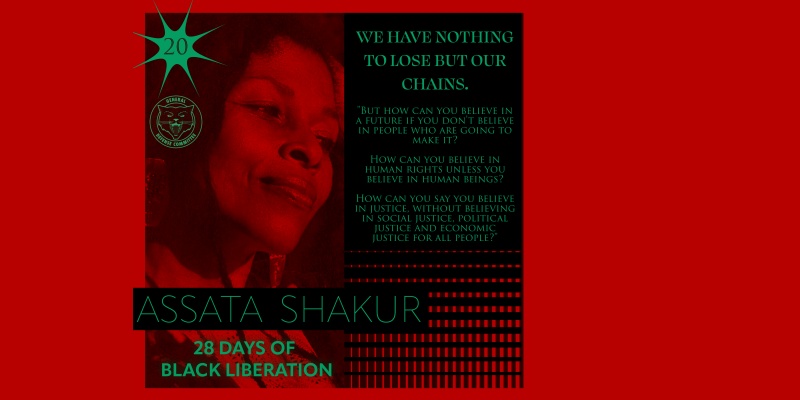Day 20 of the 28 Days of Black Liberation 2024 series
Assata Olugbala Shakur (born 1947 as Joanne Deborah Byron) was a Black Liberation fighter, author, and a political fugitive who was formerly apart of the Black Panthers in Oakland, California, and later joined the Black Liberation Army. She grew up in both New York City and North Carolina, and lived back and forth between her grandparents, her mother, then in and out of strangers’ homes until her aunt, Evelyn A. Williams, took her in. Assata attended Borough of Manhattan Community College, then transferred to City College of New York. It was there where she became politically active; participating in civil rights protests, anti-Vietnam war protests, sit-ins, and reading more about black history.
Assata, then Joanne, became involved with Black Nationalist Organizations which further shaped her political activities. In 1970 she became a member of the Harlem chapter of the Black Panther Party and helped to administrate the BPP Breakfast Program, free clinics, and community outreach. She became increasingly critical, however, of the Black Panther Party and in 1971 she joined the Black Liberation Army – an organization inspired by the Vietcong, the Algerian War for Independence and its fighters in the Battle of Algiers. The Black Liberation Army (BLA) mounted many guerilla actions against the US government, fighting on fronts for black liberation, abolitionism, anti-capitalism, and anti-imperialism.
Around this time, in 1971, she changed her name from Joanne to Assata Olugbala Shakur: Assata, a West African name meaning “she who struggles,” Olugbala, a Yoruba word for “savior” and also meaning “love for the people,” and Shakur, Arabic for “thankful one.” In her doing so, she shed her previous identity, one that she equated with an American slave name and stepped into her identity instead as an African woman.
In 1972, the FBI issued a warrant for Assata’s arrest for alleged crimes committed by the BLA, including alleged bank robberies and attacks on police. During a traffic stop in 1973 on the New Jersey Turnpike, Assata Shakur, Zayd Malik Shakur, and Sundiata Acoli were pulled over by State Troopers James Harper and Werner Foerster for a broken tail light and for “light speeding.” When asked to step out of the vehicle, a confrontation arose which turned into a shootout – resulting in the death of Zayd Shakur and Trooper Foerster. Assata was wounded with a gunshot in the arm.
Between 1973 and 1977, Assata was charged with crimes related to murder, attempted murder, bank robbery, armed robbery, and kidnapping. But it was for the death of Trooper Foerster that she was ultimately convicted, along with seven other charges. After a long series of various trials, which many black liberation organizations argued were not done fairly, (the gunshot wound left her arm paralyzed during the shootout with Trooper Foerster), Assata was sentenced to thirty years in prison. In 1979, she escaped the maximum security unit of the New Jersey Clinton Correctional Facility for Women with the help of three BLA comrades and members of the May 19 Communist Organization. She then fled to Cuba in 1984 and there was granted political asylum. In Cuba, she reunited with her daughter, Kakuya Amala Olugbala, who she birthed while incarcerated. Assata Shakur was put on the FBI’s Most Wanted Terrorists list in 2013.
She resides as a political fugitive in Cuba to this day.
In the United States, the Black liberation struggle is the vanguard of the revolutionary class struggle. Black resistance to white supremacy has been the catalyst for nearly all critical social ruptures throughout american history. White workers choosing an alliance with the bosses instead of siding with the rest of the working class is the primary roadblock to revolutionary anti-capitalism in the US.
The GDC celebrates the Black liberation struggle and draws inspiration and lessons from its proud history in our struggle for the new world we are fighting for. In February we celebrate Black revolutionary culture, political prisoners, international figures and struggles, and moments in direct action that guide us in our continued, collective fight for liberation!

